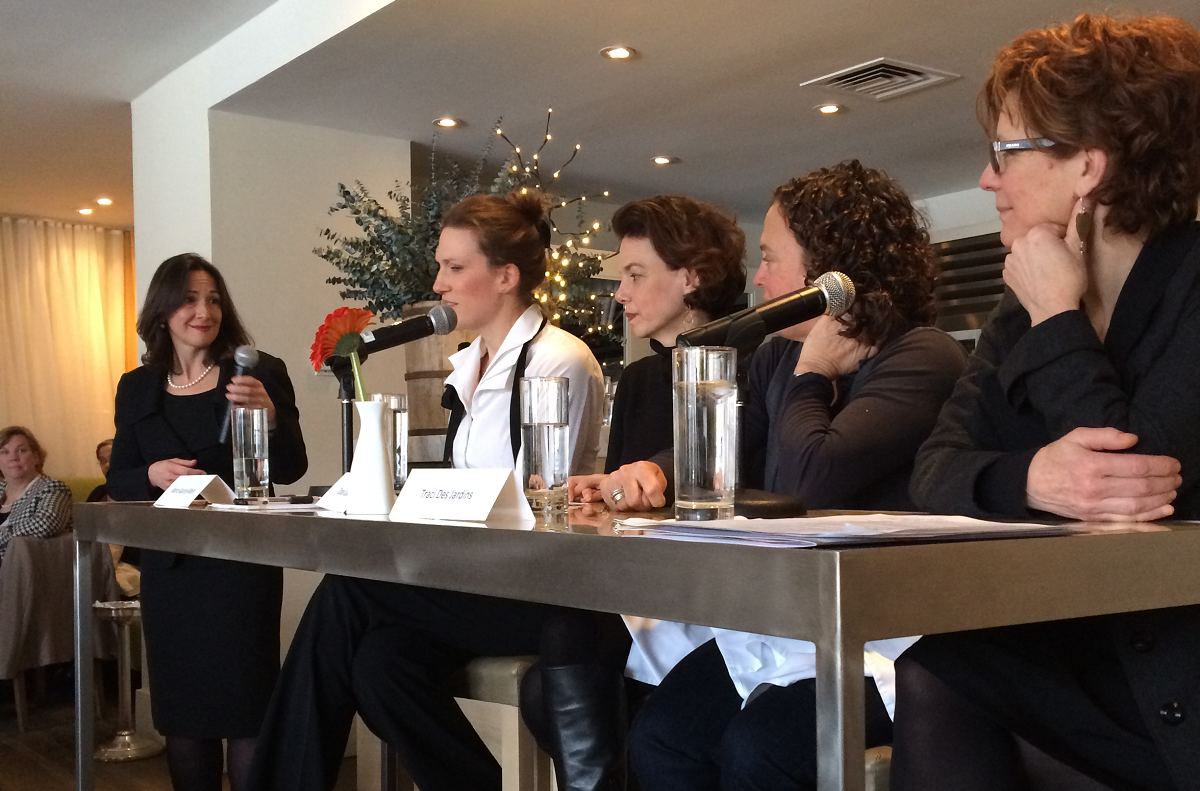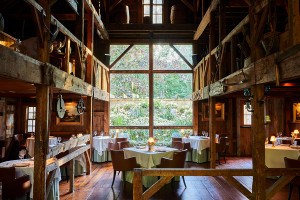Rialto’s Jody Adams: ‘We Have to Claim Our Work’

From left: Victoria Budson (standing), Morra Aarons-Mele, Dana Cowin, Traci Des Jardins, Jody Adams. Photo/Leah Mennies
On Wednesday, a formidable crew of local food luminaries including (but not limited to) Joanne Chang (Flour, Myers + Chang), Tiffani Faison (Sweet Cheeks), Mary Dumont (Harvest), Rachel Klein (the forthcoming Liquid Art House), Kristen Kish (TBD!), and Barbara Lynch (the universe) assembled in the dining room of Rialto in Harvard Square. They were gathered for a panel discussion—with Food & Wine EIC Dana Cowin, San Francisco chef Traci Des Jardins, Women Online founder Morra Aarons-Mele, and moderator Victoria Budson of Harvard’s Kennedy School—hosted by chef Jody Adams and titled “If Women in White Aren’t in the Picture, They Are Not in the Picture.”
Adams kicked off the discussion by sharing an anecdote that inspired panel’s title. In 1990, Adams had just become the head chef of the (now-defunct) restaurant Michaela’s. A photographer came by the restaurant to shoot a newspaper story on local big-name chefs—at the time in Boston, this meant, for the most part, Adams, Lydia Shire, Gordon Hamersley, and Jasper White. After the photographer got his shots of the restaurant, Adams asked if he’d be taking a photo of her. “Oh, I already have a photo of a woman,” he said. Adams immediately rang up Hamersley and White, to see if they had been photographed for the story. They had. So she turned to the photographer, and said: “You’re going to need to take my picture.” She folded her arms, and posed for the shot—and it ended up becoming a front-page food section image for the New York Times. “You don’t get what you don’t ask for, and you have to take charge of putting yourself in the picture,” Adams told the crowd.
It was the starting point for the afternoon, but only the beginning. Ahead, some other takeaways. (Plus, follow along with the live-tweet of the event here.)
Television is a necessary evil—and, actually, can be a force for good.
With both a recent Top Chef winner (Kristen Kish) and first-season finalist (Tiffani Faison) in the house, Budson asked the two chefs to contrast their experiences. For Kish, the experience was wholly positive—and she had been urged to sign up by her mentor, Barbara Lynch. “Kristen really represented morale, passion, and [knowing] when to hold back,” Lynch said of the balance required when on a show (and the strategic editing that ensues). Faison, having never seen a previous season of the show before enrolling, didn’t realize how her no-holds-barred attitude would be portrayed on-screen. The results were devastating: “I was super hard-wired and extremely competitive,” Faison said. “The whole country pointed at me and said, ‘Bitch.’” She then joked to the room: “You’re welcome, to everyone who [got to see] Season 1.”
According to Des Jardins, appearing on television is an uncomfortable experience—she even turned down an opportunity to film the first season of Top Chef at her flagship restaurant, Jardiniere. But she eventually went on Top Chef: Masters, and made it to the finals. “I now feel it is my obligation to do TV. It pushes you out into the world in ways nothing else can—it’s out of my comfort zone, but part of my job,” she said. According to Adams, who also went far on TCM, “If we as women don’t put ourselves [on TV], we run the risk of a gap for women [viewers].”
This bro-dude-chef thing perpetuates false ideas about kitchen culture.
The perception of chefs as macho, tattooed bro-dudes came up—particularly a) that to the public, that’s what all chefs are like, and b) the misconception that it always correlates with brutish kitchen behavior. “When I started 30 years ago, I had advice from Julia Child to work for Lydia Shire [to avoid the screaming culture of Paris],” Adams said. “What worries me is that we [both women and men] have worked to change the perception of kitchens. The perception [from the outside] is that it’s a rough-and-tumble frathouse. From the inside, we know it’s not like that.” This perception may be scaring off some potential female chefs from working in professional kitchens, despite the reality that the environment has largely shifted, Adams said.
That said, kitchens still need to evolve to accommodate mothers.
In a piece published on Thursday in Bloomberg about the lack of female head chefs in top kitchens, Ryan Sutton reported that many women chefs who take maternity leave don’t return to the kitchen. On Wednesday, Barbara Lynch urged the next generation of chefs to restructure kitchens to be more accommodating of those seeking a work-life balance. “It’s important for women to think about how we structure restaurants for the future,” she said. “Can we have breast-feeding lockers? Day cares?”
Self-promotion isn’t showing off.
While female chefs are just as likely to have sordid tales of down-and-dirty pig butchery and other quintessential examples of culinary badassery as male chefs, they are less likely to share them. But those are the stories that, Cowin admitted, typically garner media attention. “What I’m hearing is a need for extremes,” Aarons-Mele said. “Is it about going to the extreme, and women are less comfortable going to the extreme?” Adams responded, “We don’t want to show off.” But it’s not showing off, Cowin said, to go there with a story. “The challenge for women is to find the strength in their voice to be passionate and compelling,” she said. “It’s not unseemly to say that you did something good [or interesting].” The takeaway here? While, of course, the answer isn’t as simple (or absurd) as “women need to discuss aggressive animal butchery more often in order to get their voices heard,” there’s a larger idea at play. “It’s about facing our fears and pushing against it,” Des Jardins said. Adams was even more succinct: “We have to claim our work.”


